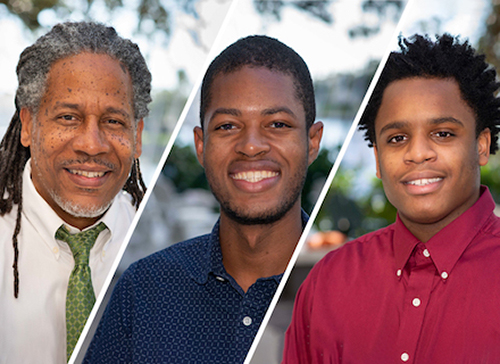Pictured above: (Left to right) Juan Dacosta, Michael Wright and Triston Williams were the first three students introduced to the Call Me MISTER program in November of 2021.
Courtesy of USF
By Sophia George
Recent grants and donations from out-of-state donors will allow two programs originally housed at the University of South Florida’s St. Petersburg campus to expand.
The two programs, the Call Me MISTER program and the USF Pearls program, are geared toward forging opportunities for underrepresented students at USF.
According to a press release, the Call Me MISTER program, which aims to increase male teachers of color in Pinellas County schools with at-risk students, received a total of $175,000 in donations. The USF Pearls program, designed to help foster care students acclimate to college life, received a total of $125,000 in donations and grants.
Call Me MISTER, founded at Clemson University, has been implemented at over 25 colleges and universities across the country. It was launched at USF St. Petersburg last January and introduced its first cohort of students in November of 2021.
After reading about the program’s initiative online, Tom and Bharti Kirchner, from Bellingham, Wash., donated $52,000 to support Call Me MISTER.
The Kirchners were motivated to get involved in the movement after witnessing racism in their own community as children and the unrest that followed the death of George Floyd in 2020, a press release said.
“We both strongly believe quality education is indispensable for equipping young people to lead lives of dignity as good citizens and productive members of society,” the Kirchners said. “The potential for each highly motivated MISTER to steer hundreds, even thousands, of young Black students in that direction during their career makes it by far the best use of our contribution that we could think of.”
The Kirchners spread the word about Call Me MISTER throughout their community, which led to an additional donation of $73,000 from their friends –– including Sita Amba-Rao, a retired professor in Washington.
Additionally, Duke Energy gifted $50,000 to the program.
“Without their support, I don’t know how we would have been able to launch the Call Me MISTER program,” Kate Samy, associate director of development at USF St. Petersburg, said. “Part of the guidelines for the program, licensed through Clemson, is that you don’t have to provide full tuition, but you do have to provide some type of financial support.”

Launched in spring of 2021, the USF Pearls program aims to raise the graduation rate among 4-year college students emerging from the foster care system — which currently sits at 3%, according to the National Foster Youth Institute.
According to a press release, there are currently 194 students from the foster care system enrolled across all three USF campuses.
The program offers each student, or “pearl,” individual coaching, group collaboration, educational activities to help them connect with others, housing opportunities, advocacy and plans to introduce a mentoring program, according to the USF Pearls website.
To get the program off the ground, Kate Tiedemann and Ellen Cotton donated $100,000 to the university. More recently, the Joy McCann Foundation, a private family foundation that awards money to charities, non-profits and universities in Tampa Bay, contributed a $25,000 grant.
These donations will help the USF Pearls program offer more one-on-one assistance and support for students coming from the foster care system.
The $25,000 grant from the Joy McCann Foundation will be split –– $15,000 will go toward an emergency fund for the students and the remaining $10,000 will be used to launch a level three training program that will allow USF to help other institutions pursue similar programs.
“We started by looking at best practices, mirroring other institutions, and trying to figure out how to develop this program,” Joseph Contes, director of Student Outreach and Support, said. “We did so intentionally by creating a coaching and care management model where we would reach out to them as soon as they were accepted.”



